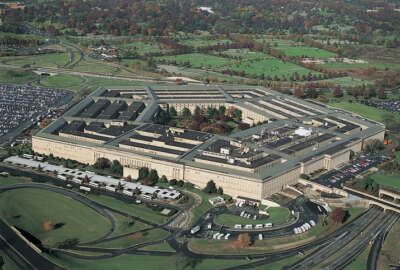The Defense Department says it could use another $10 billion to deal with the fallout of coronavirus and keep its industrial base companies afloat.
Deputy Defense Undersecretary for Acquisition and Sustainment Alan Shaffer said Tuesday that that money would, in part, go toward paying contractors for employee compensation when they couldn’t work on federal projects because of COVID-19.
Meanwhile, DoD is trying to allay congressional fears that money going to large corporations to keep the supply chain moving is actually getting down to smaller subcontractors.
The Pentagon received $10.5 billion from the original coronavirus stimulus package. DoD is also coming off of three years of budget increases, along with a supplemental budget in 2016 and a likely $741 billion appropriation from Congress for 2021.
The Trump administration recently said it is looking at developing a new coronavirus stimulus package to send to Congress. However, lawmakers may not be open to handing more money over to the military.
House Armed Services Committee Chairman Adam Smith (D-Wash.) said late last month that he opposes giving more stimulus dollars to DoD.
“We don’t need to give them any more money,” Smith told reporters Tuesday during a Defense Writers Group teleconference. “The last time I looked they had not yet spent even half of the stimulus money. Gosh, everybody, every state, every locality, every federal agency, certainly every business has had to adjust in light of COVID-19 and the impact that it has had. I have yet to see evidence that DoD cannot adjust within their existing budget string.”
Shaffer described the defense industrial base as fairly healthy compared to other sectors.
“We are tracking the number of companies who have had layoffs,” Shafer said on Government Matters. “We are somewhere under 40 companies in the defense industrial base that have had layoffs. I compare that to the rest of the nation and I think the actions the department took to accelerate payment to our supplier sub tier actually allowed them to stay in business.”
On Monday, Assistant Defense Secretary for Acquisition Kevin Fahey said only 34 of the approximately 1,000 defense-related companies that closed due to coronavirus are now shuttered.
Shaffer said DoD is still concerned about the aviation industry, which will likely take two to three years to rebound. The Pentagon is carefully watching shipbuilding, textiles and space as well.
He added that shipbuilding is looking “OK,” but the space industry has seen some contraction.
DoD recently looked at space-related companies in its base and found half had adjusted their business strategies over the next couple years.
Shaffer said since March 1, DoD sent out $4.5 billion in contract actions, Defense Production Act funds and rapid procurement.
To combat coronavirus, DoD also increased progress payments 80% to 90% of the total contract value for large companies, and from 90% to 95% in the case of small firms. The Pentagon sent about $3.3 billion in that fashion.
Sen. Elizabeth Warren (D-Mass.) sent a letter to DoD in May asking for assurances that companies would use the progress payment advances properly.
“Increasing the progress payment rate provided the department an avenue to infuse much needed liquidity to small and medium sized companies, either directly or through the major primes. Even before the rate change was in effect, the major primes took initiative to identify and target financial assistance to struggling companies,” Ellen Lord, defense undersecretary for acquisition and sustainment, wrote back in a May 15 letter.
Northrop Grumman Systems; United Launch Services, LLC; Raytheon Company; Lockheed Martin Corporation and the Boeing Company received the most funding from those progress payments, according to Lord.
“These payments represent costs incurred on our contracts and therefore are used to pay those associated bills (e.g., supplier costs, labor costs),” Lord wrote. “Companies do not divert payments for incurred costs to share buybacks, dividends or executive salaries because contractors must have already incurred costs before they receive the increased progress payments.”
However, Lord admitted there is no privity of contract between DoD and its prime contractor’s lower tiered vendors.
Lord said the companies have promised to share how they are maintaining small contractors and that she has triweekly phone calls with major corporations and industry associations.
“Big defense contractors should not be able to use the COVID-19 crisis to profit — and DoD must use every tool available to hold these contractors accountable,” Warren said in a statement. “I will continue to ask questions and request information on increased progress payments to ensure there is no waste, fraud or abuse under this policy.”
DoD is closely watching the industrial base as a second wave of coronavirus is taking hold. Though most businesses are open, employees are still getting infected.
“We are seeing a lot of cases of COVID, a lot of cases in our defense industrial base, it’s pretty consistent with what you see in the news,” Fahey said. “It tends to be the younger grouping of people for the most part. When more people get sick it spreads.”
Copyright
© 2024 Federal News Network. All rights reserved. This website is not intended for users located within the European Economic Area.

